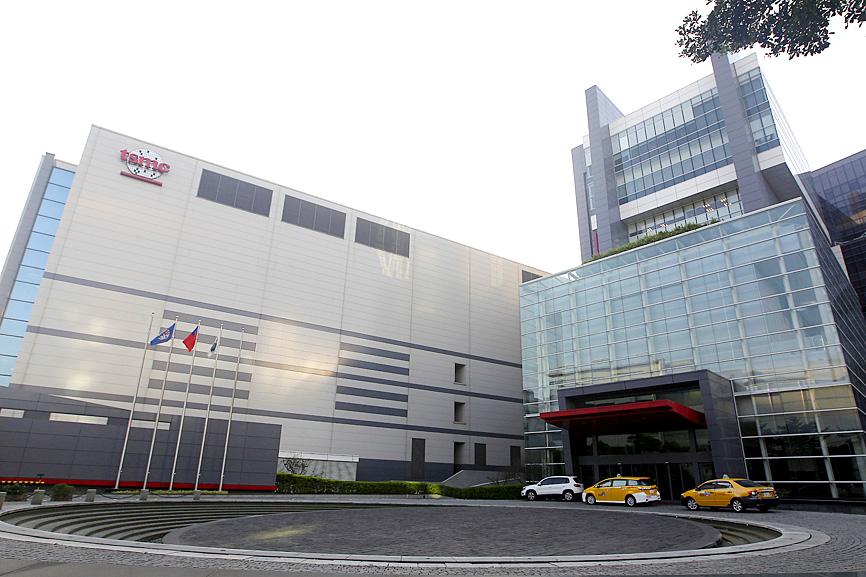Silicon Saxony, a semiconductor cluster in Dresden, Germany, has touted its strength as a technology hub as Taiwan Semiconductor Manufacturing Co (TSMC, 台積電) considers the possibility of building a plant in the European country.
Silicon Saxony chief executive officer Frank Bosenberg told the Central News Agency that his association has transformed itself into one of the five largest semiconductor clusters in the world and has become a competitive investment destination.
Bosenberg did not comment on the speculation that TSMC, the world’s largest contract chipmaker, might choose Dresden as the base for its investments in Germany.

Photo: Pichi Chuang, Reuters
He said Silicon Saxony is highly capable of developing chips for emerging application use, including automotive electronics and 6G communications.
Dresden is home to the largest semiconductor cluster in Europe, with tech giants such as contract chipmaker GlobalFoundries Inc, automotive electronics chipmaker Infineon Technologies AG and auto parts supplier Robert Bosch GmbH forming Silicon Saxony.
In an annual general meeting on July 26, TSMC chairman Mark Liu (劉德音) said that the company is considering the possibility of setting up a production base in Germany, but added that discussions were still at an early stage.
Liu said TSMC has been communicating with its customers in Germany to find out whether such an investment would benefit them.
Bosenberg said that automotive electronics chips have served as a driving force in Silicon Saxony’s development, while several automakers, including BMW AG, Volkswagen AG and Porsche AG, have production facilities nearby.
In addition, 6G communications, robotics, the Internet of Things, quantum computers and software have also become a focus of Silicon Saxony’s research and development efforts, he said.
Several major companies, including GlobalFoundries, Infineon, Bosch, Carl Zeiss AG and Vodafone Group PLC, have invested in the past four years or said they would invest over the next 16 months in Silicon Saxony, with a combined 8 billion euros (US$9.4 billion), Bosenberg said.
TSMC has said it is also considering expanding its investments in the US and Japan to meet strong demand from its customers in those markets.
Ray Yang (楊瑞臨), a supervisor at the Industrial Technology Research Institute’s (工業技術研究院) Industrial Economics and Knowledge Center, said TSMC’s investments in Japan and Germany are likely to differ from its investments in the US.
Unlike a planned facility to be built in Arizona that would use the 5-nanometer process, TSMC’s plants in Japan and Germany are expected to use specialty processes, which would cater to automakers in the two markets, Yang said.
The company is expected to directly supply chips to customers in Japan such as Sony Corp, which manufactures sensors for auto production, he said.
Automotive electronics are expected to become mainstream for semiconductor development over the next few years, following 5G applications and high-performance computing devices, he said.

Semiconductor business between Taiwan and the US is a “win-win” model for both sides given the high level of complementarity, the government said yesterday responding to tariff threats from US President Donald Trump. Home to the world’s largest contract chipmaker, Taiwan Semiconductor Manufacturing Co (TSMC, 台積電), Taiwan is a key link in the global technology supply chain for companies such as Apple Inc and Nvidia Corp. Trump said on Monday he plans to impose tariffs on imported chips, pharmaceuticals and steel in an effort to get the producers to make them in the US. “Taiwan and the US semiconductor and other technology industries

The US Federal Reserve is expected to announce a pause in rate cuts on Wednesday, as policymakers look to continue tackling inflation under close and vocal scrutiny from US President Donald Trump. The Fed cut its key lending rate by a full percentage point in the final four months of last year and indicated it would move more cautiously going forward amid an uptick in inflation away from its long-term target of 2 percent. “I think they will do nothing, and I think they should do nothing,” Federal Reserve Bank of St Louis former president Jim Bullard said. “I think the

SMALL AND EFFICIENT: The Chinese AI app’s initial success has spurred worries in the US that its tech giants’ massive AI spending needs re-evaluation, a market strategist said Chinese artificial intelligence (AI) start-up DeepSeek’s (深度求索) eponymous AI assistant rocketed to the top of Apple Inc’s iPhone download charts, stirring doubts in Silicon Valley about the strength of the US’ technological dominance. The app’s underlying AI model is widely seen as competitive with OpenAI and Meta Platforms Inc’s latest. Its claim that it cost much less to train and develop triggered share moves across Asia’s supply chain. Chinese tech firms linked to DeepSeek, such as Iflytek Co (科大訊飛), surged yesterday, while chipmaking tool makers like Advantest Corp slumped on the potential threat to demand for Nvidia Corp’s AI accelerators. US stock

Cryptocurrencies gave a lukewarm reception to US President Donald Trump’s first policy moves on digital assets, notching small gains after he commissioned a report on regulation and a crypto reserve. Bitcoin has been broadly steady since Trump took office on Monday and was trading at about US$105,000 yesterday as some of the euphoria around a hoped-for revolution in cryptocurrency regulation ebbed. Smaller cryptocurrency ether has likewise had a fairly steady week, although was up 5 percent in the Asia day to US$3,420. Bitcoin had been one of the most spectacular “Trump trades” in financial markets, gaining 50 percent to break above US$100,000 and